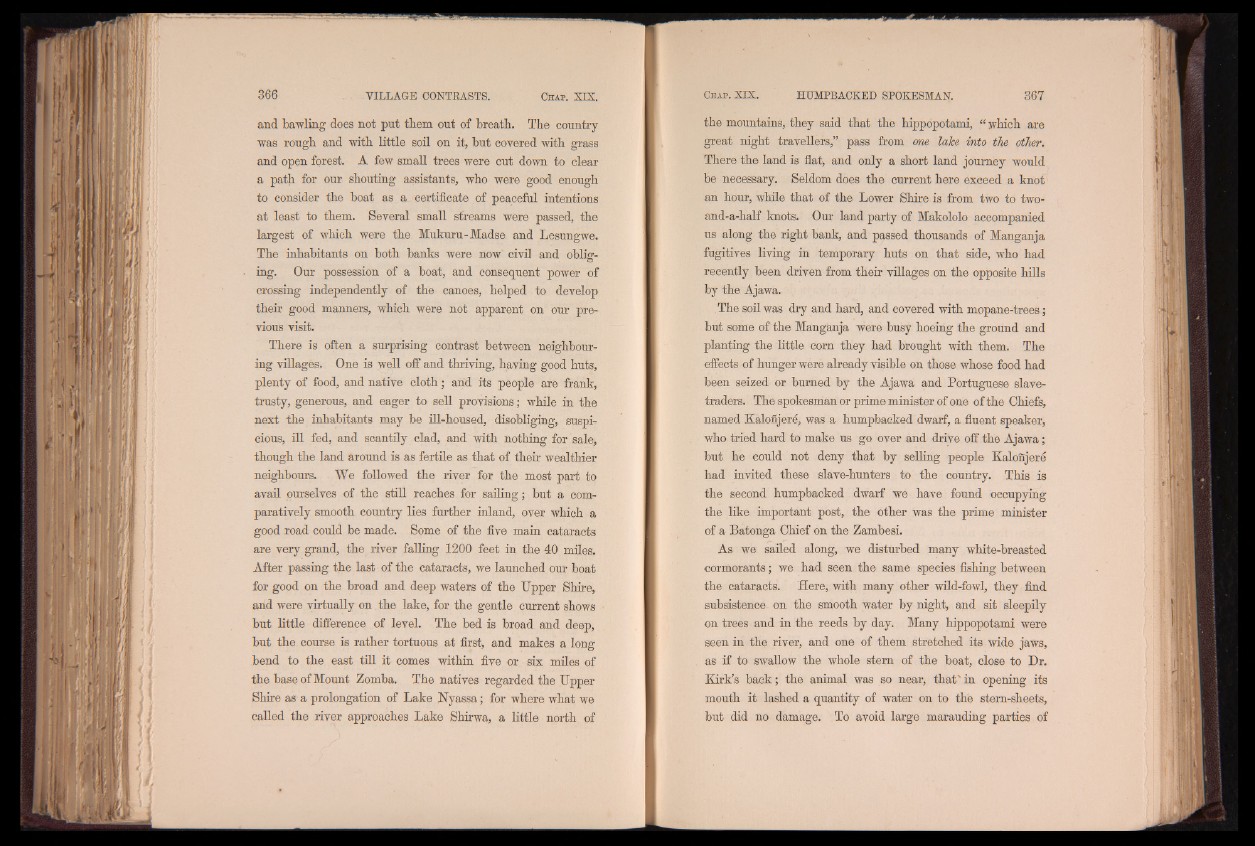
and bawling does not put them out of breath. The country
was rough and with little soil on it, but covered with grass
and open forest. A few small trees were cut down to clear
a path for our shouting assistants, who were good enough
to consider the boat as a certificate of peaceful intentions
at least to them. Several small streams were passed, the
largest of which were the Mukuru-Madse and Lesungwe.
The inhabitants on both banks were now civil and obliging.
Our possession of a boat, and consequent power of
crossing independently of the canoes, helped to develop
their good manners, which were not apparent on our previous
visit.
There is often a surprising contrast between neighbouring
villages. One is well off and thriving, having good huts,
plenty of food, and native cloth; and its people are frank,
trusty, generous, and eager to sell provisions; while in the
next the inhabitants may be ill-housed, disobliging, suspicious,
ill fed, and scantily clad, and with nothing for sale,
though the land around is as fertile as that of their wealthier
neighbours. We followed the river for the most part to
avail ourselves of the still reaches for sailing; but a comparatively
smooth country lies further inland, over which a
good road could be made. Some of the five main cataracts
are very grand, the river falling 1200 feet in the 40 miles.
After passing the last of the cataracts, we launched our boat
for good on the broad and deep waters of the Upper Shire,
and were virtually on the lake, for the gentle current shows
but little difference of level. The bed is broad and deep,
but the course is rather tortuous at first, and makes a long
bend to the east till it comes within five or six miles of
the base of Mount Zomba. The natives regarded the Upper
Shire as a prolongation of Lake Nyassa; for where what we
called the river approaches Lake Shirwa, a little north of
the mountains, they said that the hippopotami, “ which are
great night travellers,” pass from one lake into the other.
There the land is flat, and only a short land journey would
be necessary. Seldom does the current here exceed a knot
an hour, while that of the Lower Shire is from two to two-
and-a-half knots. Our land party of Makololo accompanied
us along the right bank, and passed thousands of Manganja
fugitives living in temporary huts on that side, who had
recently been driven from their villages on the opposite hills
by the Ajawa.
The soil was dry and hard, and covered with mopane-trees;
but some of the Manganja were busy hoeing the ground and
planting the little corn they had brought with them. The
effects of hunger were already visible on those whose food had
been seized or burned by the Ajawa and Portuguese slave-
traders. The spokesman or prime minister of one of the Chiefs,
named Kalonjere, was a humpbacked dwarf, a fluent speaker,
who tried hard to make us go over and drive off the Ajawa;
but he could not deny that by selling people Kalonjere
had invited these slave-hunters to the country. This is
the second humpbacked dwarf we have found occupying
the like important post, the other was the prime minister
of a Batonga Chief on the Zambesi.
As we sailed along, we disturbed many white-breasted
cormorants; we had seen the same species fishing between
the cataracts. Here, with many other wild-fowl, they find
subsistence on the smooth water by night, and sit sleepily
on trees and in the reeds by day. Many hippopotami were
seen in the river, and one of them stretched its wide jaws,
as if to swallow the whole stern of the boat, close to Ur.
Kirk’s back; the animal was so near, that' in opening its
mouth it lashed a quantity of water on to the stem-sheets,
but did no damage. To avoid large marauding parties of